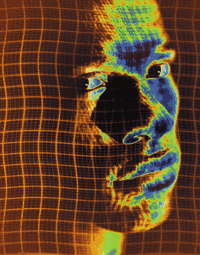.: Click here to download :.
Speaker recognition is the process of automatically recognizing who
is speaking on the basis of individual information included in
speech waves. This technique makes it possible to use the speaker's
voice to verify their identity and control access to services such
as voice dialing, banking by telephone, telephone shopping, database
access services, information services, voice mail, security control
for confidential information areas, and remote access to computers.
Speaker
identity is correlated with the physiological and behavioral
characteristics of the speaker. These characteristics exist both in
the spectral envelope (vocal tract characteristics) and in the
supra-segmental features (voice source characteristics and dynamic
features spanning several segments).
The most common short-term spectral measurements currently used are
Linear Predictive Coding (LPC)-derived cepstral coefficients and
their regression coefficients. A spectral envelope reconstructed
from a truncated set of cepstral coefficients is much smoother than
one reconstructed from LPC coefficients. Therefore it provides a
stabler representation from one repetition to another of a
particular speaker's utterances. As for the regression coefficients,
typically the first- and second-order coefficients are extracted at
every frame period to represent the spectral dynamics. These
coefficients are derivatives of the time functions of the cepstral
coefficients and are respectively called the delta- and delta-delta-cepstral
coefficients.
Index Terms: speaker, recognition, verification, sound, words.
 |
Figure 1. Microphone |
||||||||||||||
|
A simple and effective source code for Speaker Recognition. This code is based on Amin Koohi's excellent submission available here and improves results using an advanced metric for distance computation. In this way a better recognition rate is achieved. On the initial dataset (8 speakers) we obtain a recognition rate of 100% (the previuos one was 87.5%). We can achieve analogous results (100% recognition rate) for a larger dataset (11 speakers). |
|||||||||||||||
Demo code (protected
P-files) available for performance evaluation. Matlab Signal Processing Toolbox is required. |
|||||||||||||||
|
Release |
Date |
Major features |
|||||||||||||
|
1.0 |
2005.12.07 |
|
|||||||||||||
We recommend to check the secure connection to PayPal, in order to avoid any fraud. This donation has to be considered an encouragement to improve the code itself. |
|||||||||||||||
Speaker Recognition System - Release 1.0 - Click here for
your donation. In order to obtain the source code you
have to pay a little sum of money: 18 EUROS (less
than 26 U.S. Dollars). |
|||||||||||||||
Once you have done this, please email us luigi.rosa@tiscali.it As soon as possible (in a few days) you will receive our new release of Speaker Recognition System. Alternatively, you can bestow using our banking coordinates:
|
|||||||||||||||
The authors have no relationship or partnership
with The Mathworks. All the code provided is written in Matlab
language (M-files and/or M-functions), with no dll or other
protected parts of code (P-files or executables). The code was
developed with Matlab 14 SP1. Matlab Signal Processing Toolbox is required.
The code provided has to be considered "as is" and it is without any kind of warranty. The
authors deny any kind of warranty concerning the code as well
as any kind of responsibility for problems and damages which may
be caused by the use of the code itself including all parts of
the source code.

